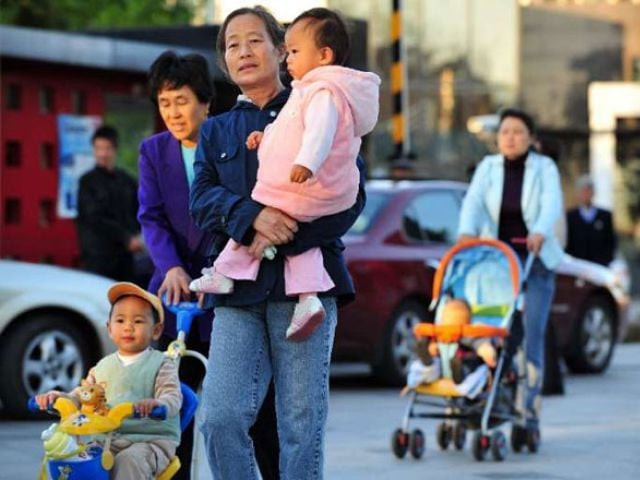Activist underwhelmed by Chinese pledge to leave no child behind
More than 60 million such children in China, largely in poor rural areas, face odd circumstances

PHOTO: AFP
There are more than 60 million such children in China, largely in poor rural areas, and their circumstances have repeatedly made grim headlines.
Last summer four siblings aged from five to 14 apparently committed suicide by drinking pesticide after being left to fend for themselves by their parents, both migrant workers, in Bijie in the poverty-stricken southwestern province of Guizhou.
In 2012 five left-behind cousins and brothers, aged nine to 13, died of carbon monoxide poisoning as they tried to burn coal to keep warm in a rubbish bin in the same town.
China to limit family size for up to 30 years, despite concerns
Many migrant parents cannot take their children with them. The strict "hukou" household registration system denies them equal access to services such as health and education when they are away from their birthplace.
China's cabinet, the State Council, released guidelines at the weekend calling on parents, schools, charities and government alike to play a larger role in helping such children.
Townships should open files on each left-behind child, visit them regularly, and help their parents contact them through voice and video calls, the document said.
It stipulated that "in serious cases or cases that lead to serious consequences", the parents could be held "accountable according to the law".
Migrant families should be offered housing stipends and schools in destination cities made more open to their children, the guidelines added.
But they were not legally binding and enforcement was left up to local officials.
Chen Lan, head of the child protection NGO Little Hope, told AFP Tuesday: "Are you really going to arrest the parents? If you've really arrested them, how are you going to sentence them? Who will supervise this, implement it and determine the sentence?"
She welcomed the fact that for "the first time the issue of brutal parent-child separation has been presented as a nationally important systemic problem".
But the cause of the problem was intractable, she added.
"When all the resources of the village have been exhausted, and employment opportunities and the income from labour are decreasing, it is irreversible that parents leave their children and go to the cities to find better jobs," she said.
Citing 2010 census data, the All-China Women's Federation said in a report three years ago that the country had 61 million left-behind children.
China's new two-child policy law takes effect
Of those, 57 percent lived with their grandparents, others stayed with one parent or other guardians and three percent were by themselves, it said.
Despite hukou restrictions millions of children have accompanied their parents to cities but face huge disadvantages, Chen said. "They live on the margins of the city, without access to schools or medical care."



















COMMENTS
Comments are moderated and generally will be posted if they are on-topic and not abusive.
For more information, please see our Comments FAQ